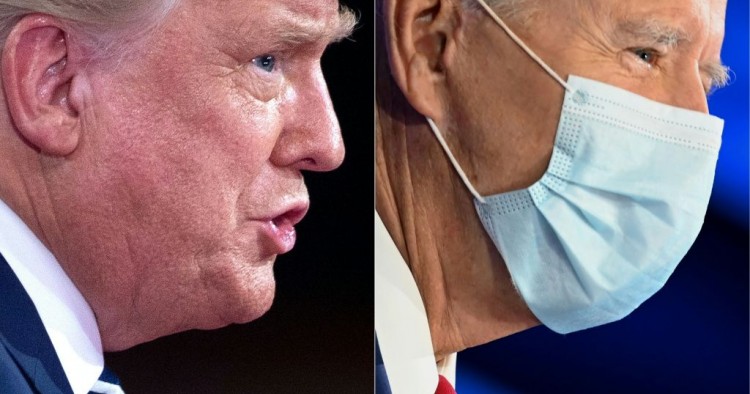This week's briefing on recent news and upcoming events in the region featuring Paul Salem, Michael Sexton, Alex Vatanka, and Gerald Feierstein.
Bracing for Tuesday and the interregnum
Paul Salem
President

The Middle East, like other parts of the world, is riveted by the drama unfolding in the United States. The conditions in which the elections are held and contested, and the outcome — if and when it is decided — will have multilevel consequences in the region.
On a macro level, these elections put the historical role and trajectory of the U.S. as the torchbearer of liberal democracy in crisis. Donald Trump has led as an authoritarian populist, and has regularly denigrated the institutions that uphold a pluralist civil society, the rule of law, and the institutions of democracy. He has refused to commit to the peaceful transfer of power, and has told his followers that if he loses the election, it is because the election was fraudulent and must be challenged or overturned.
Through its ups and downs over the past century, the U.S. has steadily been an example of a democratic alternative. This democratic example, and others in Europe, helped animate groups and movements in the Middle East from the 19th century up through the recent uprisings in Sudan and other Arab countries. If the democratic experiment is being rejected in one of its main homelands, that surely will bring solace to both autocrats and Islamists in the Middle East, and further despair to those struggling for a more liberal and democratic future. Islamists, in particular, might be heartened, because Trump and his followers have emphasized cultural identity, religion, past glory, and group feeling as the basis of political action — an approach that coheres with the Islamists’ appeal to their audiences.
On a more practical level, there will be policy consequences relating to the Middle East hanging on the outcome of the elections. In the case of a clear victory by Joe Biden and a smooth transition in January 2021, one can expect some elements of change and some of continuity. It’s important to keep in mind that Biden was in the White House only four years ago, and most of his foreign policy team would pick up where Obama left off in January 2017. The largest change from Trump is likely to come in Iran policy, where a Biden administration would seek to return to the Iran nuclear deal, albeit while trying to strengthen some of its key clauses and attempt new negotiations on Iran’s missile systems and regional deployments. Biden would remain tough on Iran while engaging in diplomacy; this is likely to lead to de facto “coexistence” with Iran in the region, as Obama suggested late in his term. On Israel-Palestine, a Biden administration will renounce Trump’s so-called deal of the century, but will be facing a much more emboldened Israeli government and a more isolated Palestinian Authority; regionally, Biden welcomed the normalization agreements between several Arab states and Israel and will build on that momentum. One key positive is that Biden will strengthen the role of diplomacy in his administration, and this might lead to more effective efforts to end the civil wars in Yemen and Libya.
A Trump victory will indicate a continuation and intensification of the policies of his first term. This will include continued strong alignment with Gulf allies and Israel, and continued maximum pressure on Iran. Trump has said that he expects Iran to come to the table if he wins a second term, but it is more likely that Iran will circle the wagons and hunker down to weather the ensuing four years, rather than negotiate. It will be hard to predict whether Trump will keep any U.S. troops in Syria, Iraq, or Afghanistan throughout a second term.
A third scenario, aside from a clear Biden or Trump victory, is that the election results are disputed by President Trump and that the country enters into a period of contestation, riots, and outbreaks of armed conflict that — unlike the 2000 election — is not settled smoothly and civilly in December, but drags on through 2021 and possibly beyond. Many countries have seen their democratic institutions break down; the U.S. would not be the first. In such a scenario, U.S. policy and power would be effectively paralyzed in the Middle East — and elsewhere — leaving regional powers to fend for themselves, and giving huge advantage to other global powers such as Russia and China.
@paul_salem
Foreign interference and the 2020 election
Michael Sexton
Fellow and Director, Cyber Program

As the 2020 election nears a close, apprehensions of Iranian interference in the campaign are now crystallizing. While Iran has sought to replicate Russia’s notorious influence campaign in the 2016 election, the scale and impact of its efforts have been more modest.
Iran’s intentions to meddle in the election became clear in October 2019, when Microsoft announced that Iranian hackers had targeted email accounts belonging to Donald Trump’s reelection campaign. The hacking efforts, which Microsoft disclosed proactively, were apparently thwarted.
Iran has also sought to influence politics through social media campaigns on Facebook, Instagram, Twitter, and fake news websites. The aims of these campaigns have differed from Russia’s, typically focusing more narrowly on U.S. foreign policy adventurism and police brutality; while Russia has also tailored messaging to these issues, its campaign messaging is highly diverse, with other networks focusing on law and order, political corruption, and Christian values. Despite the differences in focus, the substance of Iran’s 2020 election interference strategy is largely cribbed from Russia’s in 2016.
A notably distinct feature of Iran’s 2020 interference efforts has been the false-flag threatening emails delivered to Democratic voters, ostensibly from the white supremacist Proud Boys. At first blush this operation was unusual for its apparent aim of suppressing the Democratic vote, whereas Iran in general has sought to damage Trump’s candidacy — not Joe Biden’s.
Two aspects of influence campaigns explain this abnormality. First, effective influence campaigns exploit preexisting political cleavages, and fear of white supremacist militants — to whom Trump had just delivered a mealy-mouthed “stand back and stand by” — was ripe for exploitation. Second, influence campaigns seek not only to steer support toward a preferred candidate, but to undermine the legitimacy of the election if the undesired candidate wins. If Trump apparently won reelection thanks in part to a hate group’s illicit voter suppression, his victory and legitimacy would be irrevocably tainted — a small but meaningful score for Iran.
It is hard to tell whether the meagerness of Iran’s 2020 interference is because its government is less savvy than Russia’s or whether the U.S. — the government, tech companies, and journalists — is simply savvier than it was in 2016. Inarguably, every American entity with a role in thwarting election meddling is far more alert and better equipped today than it was four years ago. Anyone seeking to replicate Russia’s 2016 interference would have a harder time, regardless of their sophistication or wherewithal.
But while the specter of meddling is more muted, it is not gone. Iran and Russia gain not only when their preferred candidates succeed, but when the American public loses trust in the electoral process and perceives its leaders as illegitimate. This more nuanced objective is known as “perception hacking.” Direct impact notwithstanding, the mere notion that this election may have been swayed at all by foreign actors damages the U.S. government’s credibility both at home and abroad. Going into what may be the most intensely litigated election in two decades, now more than ever it is imperative for all parties and candidates to affirm the legitimacy of the electoral process and its results, whatever they may be.
@MikeESexton
Iran’s coming demographic crisis
Alex Vatanka
Director of Iran Program and Senior Fellow, Frontier Europe Initiative

It has been known for some time that Iran is about to experience a demographic crisis in the coming years. A number of factors are at play but two certainties are undeniable. First, the authorities in Tehran are hellbent on politicizing the matter. Second, a sustainable reversal of the demographic decline requires sweeping socioeconomic changes and loosening of the rigid rules that govern the Islamic Republic. The data speaks for itself.
The age of the average Iranian has increased from 22 years in 1950 to 32 years in 2019, about 2.5 years older than the global average. Reports from Iran suggest that if trends continue the country could have the oldest population in the world by 2050, when one out of every three Iranians will be over the age of 60. By contrast, in the 1980s Iran was one of the fastest growing countries in the world with a 4 percent growth rate — adding 18 million people to its population in the decade from 1981 to 1991. Twenty years ago, Iranian women had an average of five children, while today it stands at just two. Trends are influenced by many socio-political and economic factors and they change over time, but the decline in the birth rate is clearly not all about more awareness and better public health.
There is an undeniable sense of hopelessness in Iranian society, affecting everything from record high rates of those who want to emigrate to record low numbers of new marriages. From 1996 to 2017, the rate of abortions increased by 375 percent. This data was released by a media outlet close to the Revolutionary Guards, the powerful hardline powerbrokers that forever see foreign conspiracies behind any news they do not like. In this case, population control programs pushed and funded by international organizations are to blame. The evidence would suggest, however, that no one factor can be blamed, but at the same time there is no doubt that Tehran’s foreign policy, which has resulted in unprecedented sanctions and economic hardship at home, plays a major role in the declining demographics.
Again, the data is telling. Since 1979, population growth in Iran has overwhelmingly come from rural areas of the country, but even this segment of society is no longer immune to the pain of sanctions. President Hassan Rouhani’s government recently admitted that in the last year alone some 1.2 million jobs were lost in Iran. Of this number, 817,000 were in the service sector, while 346,000 were in agriculture in rural areas, leaving many young men jobless and frustrated. Instead of worrying about an aging population, the authorities in Tehran need to worry about the armies of young unemployed Iranians who have no faith in the political system that governs them.
@AlexVatanka
Will an Emirati consulate in Laayoune open the door to Morocco-Israeli normalization?
Gerald Feierstein
Senior Vice President

The UAE announced last week that it will open a consulate in the Western Sahara town of Laayoune. It will be the first Arab state to maintain a presence in the disputed region claimed by Morocco and the Algerian-backed Polisario movement. Fifteen African governments maintain a diplomatic presence in Laayoune, including Zambia and Eswatini (formerly Swaziland), both of which opened their missions a week ago. Pressing for international recognition of its control of the Western Sahara, rich in phosphates and fisheries, has been Rabat’s highest diplomatic priority.
The Emirati announcement of its intention to open a mission in Laayoune may presage other Arab states following suit despite Algerian opposition. More importantly, the Emirati move may be the key to opening the door for Israeli-Moroccan relations. Although Morocco has long maintained a cordial but quiet de facto relationship with Israel, it has been reluctant to formalize ties. As the Trump administration pressed its normalization initiative in a number of Arab capitals, seen by the White House as strengthening the president’s re-election bid as well as enhancing Benjamin Netanyahu’s grip on power, Rabat let it be known that recognition of its position in the Western Sahara was its quid pro quo. Washington proved to be surprisingly reluctant to take the step, but Emirati willingness to step into the breach may be sufficient for Morocco to follow the UAE, Bahrain, and Sudan in announcing it will formalize its relations with Israel.
@j_feierstein
Photo by BRENDAN SMIALOWSKI,JIM WATSON/AFP via Getty Images
The Middle East Institute (MEI) is an independent, non-partisan, non-for-profit, educational organization. It does not engage in advocacy and its scholars’ opinions are their own. MEI welcomes financial donations, but retains sole editorial control over its work and its publications reflect only the authors’ views. For a listing of MEI donors, please click here.













